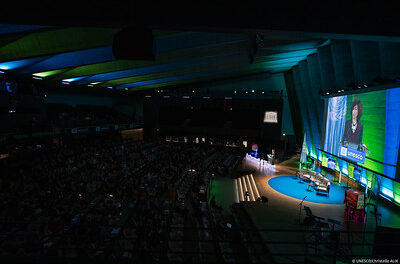Source: UNESCOPRESS
The Director-General of UNESCO, Irina Bokova, awarded the prestigious 2015 UNESCO/Guillermo Cano World Press Freedom Prize to imprisoned Syrian journalist and human rights activist Mazen Darwish on Sunday evening. The award ceremony took place at the Latvian National Library in Riga on the occasion of World Press Freedom Day celebrated every year on 3 May, in the presence of the President of Latvia, Andris Bērziņš. Laimdota Straujuma, the Prime Minister of Latvia was present at the ceremony alongside Foreign Minister Edgars Rinkēvičs and Culture Minister Dace Melbārde. Ulla Koski, Vice President of Helsingin Sanomat Foundation also took part in the event.
After paying tribute to the laureate, President Bērziņš called for “improvement in the quality of mass media, practical support for investigative journalism and the strengthening of a diverse, independent, and free media environment […]. The ability of the members of our societies to themselves evaluate and analyse the information offered up by mass media is just as important as other factors. Freedom of expression in this internationally turbulent time is equivalent to a professional and honest journalism. Freedom for the media and the professional accountability of the media go hand-in-hand,” he said.
Speaking at the ceremony, the Director-General of UNESCO said, “Today, more than ever, we need champions for freedom of expression. This is why we have gathered today, to honour a person who has never relented in fighting for his freedom to speak, to publish, to be heard.”
Yara Bader, Director of the Syrian Centre for Media and Freedom of Expression (CMFE) and wife of Mr Darwish, accepted the Prize on behalf of her husband, who has been in jail since February 2012.
“Mazen Darwish is one those few, characterized by a deep moral sense and conscious of the ethical responsibilities of humanity before anything else,” said Ms Bader. “He chose of his own free will to dedicate more than ten years of his life to this commitment. He gave up a lot on a personal level when he went back and worked in Syria, in spite of the repressive conditions there,” said Ms Bader in a moving speech delivered through an interpreter.
Mr Darwish is one of Syria’s most prominent press freedom advocates. He is the president of the CMFE and a founding member of several independent media outlets critical of the conflict in the country, including the Voice newspaper, the Media Club magazine on media affairs, and syriaview.net, a news website banned by the Syrian authorities. Despite numerous requests for his release from human rights organizations, press freedom NGOs, UN bodies, and intergovernmental organizations, Darwish remains imprisoned to this day, as are his colleagues Hani Al-Zitani and Hussein Ghareer.
Ana Maria Busquets de Cano, widow of the assassinated Colombian journalist Guillermo Cano after whom the Prize has been named, spoke about past laureates saying that “the life stories of those who have received this prize is a wake-up call regarding certain values of journalism that cannot be lost, or that cannot fade, such as independence, responsibility and the common good.”.
The Chairperson of the international jury of the UNESCO/Guillermo Cano Press Freedom Prize, Ko-Ko U, echoed Ms Cano’s sentiment when he said that Mr Darwish was awarded the Prize “for his professional career, more than a decade of personal sacrifice in which he suffered incessant harassment, travel bans, arrests, and torture”.
Earlier on 3 May, Ms Bokova opened UNESCO’s main 2015 World Press Freedom Day event at the National Library in Riga, a major international conference jointly hosted by the Organization and the Ministry of Foreign Affairs of Latvia. The conference brought together more than 90 speakers, 450 journalists, freedom of expression experts, civil society, governmental representatives, UN agencies, and academics from over 80 countries. The theme for World Press Freedom Day 2015 is “Let Journalism Thrive! Towards Better Reporting, Gender Equality and Media Safety in the Digital Age”.
Notable speakers at the conference included David Kaye, UN Special Rapporteur on Freedom of Expression; Doug Frantz, US Assistant Secretary of State for Public Affairs; Anda Rožukalne, Chair of Latvian Association of Journalists; Ilze Jaunalksne, Anchor of Latvian TV programme “Nekā Personīga”; Cilla Benko, Director-General, Swedish Radio; Peter Greste, an Al Jazeera correspondent who was imprisoned in connection with his work; Hamid Mir, an anchor on GEO TV, who survived an assassination attempt in Pakistan; Maria Ressa, CEO of the news website Rappler; and Ecuadorian cartoonist “Bonil”.
A joint message was issued by United Nations Secretary-General Ban Ki-moon, UN High Commissioner for Human Rights Zeid Ra’ad Al Hussein, and Irina Bokova to mark the Day, declaring that “quality journalism enables citizens to make informed decisions about their society’s development”.
Awarded annually on the occasion of World Press Freedom Day on 3 May, the UNESCO/Guillermo Cano World Press Freedom Prize rewards a person, organization or institution that has made an outstanding contribution to the defence and, or, promotion of press freedom anywhere in the world, and especially when this has been achieved under perilous circumstances and risks. It was established by UNESCO’s Executive Board in 1997 and is awarded on the recommendation of an independent International Jury consisting of twelve news professionals.


